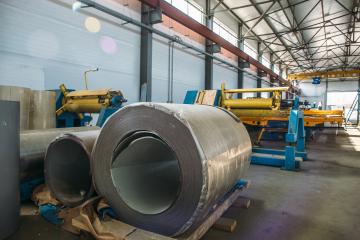This blog is the second in a four-part series focused on eco-industrial parks – communities of businesses working together to enhance their combined environmental, economic and social performance. The series offers insights from related GIZ and UNIDO projects that support the uptake of materials efficiency practices to promote cleaner production and climate-resilient business infrastructures.
Eco-industrial parks are the key to inclusive and sustainable industrial development, as they promote cross-industry and community collaboration for common benefits related to economic, social and environmental performance. By mainstreaming and upscaling eco-industrial parks, countries can develop a more competitive and resilient industrial manufacturing base. This is one of the main goal’s of the Global Eco-Industrial Parks Programme (GEIPP) developed by the United Nations Industrial Development Organization (UNIDO).
How can eco-Industrial parks promote materials efficiency?
Eco-indutrial parks have a key role to play in the delivery of materials efficiency and reducing a company’s environmental footprint. By following Resource Efficient Cleaner Production (RECP) processes, enterprises can improve the productive use of natural resources to increase production efficiency and minimize their environmental impact.

In addition to improvements in an individual company, RECP processes identify entry points for industrial and infrastructure synergies. For example, energy or material side-streams and by-products can be used to the benefit of neighbouring companies hrough industrial symbiosis. Alternatively, infrastructure synergies can be created through sharing input or effluent treatment infrastructure.
Developing a safe, resilient and materials-efficient industrial park can also be promoted by spatial planning and zoning. Such work can be extended to assess key risks, including climate change and resource availability, enabling the long-term success of the eco-park.
What is UNIDO’s approach?
UNIDO developed a toolkit to help countries identify the best entry points for the successful implementation of eco-industrial parks, as well as guide park management and industrial park companies in the process. The toolkit offers industrial park managers and policymakers the right tools to scale up efforts and reap the social, economic and environmental benefits they entail.
The tools provide step-by-step guidance to assess an industrial park against the International Framework for Eco-Industrial Parks and subsequently identify, prioritise, plan, manage and monitor eco-industrial park initiatives. They also help identify and implement RECP action and industrial symbiosis in a given eco-industrial park. In addition, the tools provide a structure for monitoring the implemention of eco-industrial park approaches. Further tools are being designed on the eco-industrial park concept and master planning, mapping value-added services by park management as well as facilitating access to finance.
How can SMEs benefit from the eco-industrial park concept?
Small and medium-sized enterprises (SMEs) can greatly benefit from being in an eco-industrial park, which can provide many opportunities for developing and expanding their business given that potential customers are located in the same park. Indeed, eco-industrial parks attract tenants with extensive networks that can facilitate the business development of SMEs. Moreover, SMEs can also take advantage from all service synergies offered, such as material waste exchanges.
UNIDO’s GEIPP provides specific assistance to SMEs, notably by undertaking RECP assessments where possible actions on materials, water and energy efficiency are identified. These assessments involve a rigourous in-company inspection with material, water and energy measurements and technology appraisal. The resulting technical, environmental and economic feasibility studies help identify the most effective solution for action. More than a 1,000 enterprises in more than 60 countries have incorporated RECP methods and tools into their business operations with many more benefitting from rapid assessments. These solutions are jointly implemented, resulting in more profitable and resource efficient operations for SMEs.
To illustrate, an RECP assessment enabled a Ukrainian firm in the Kyiv region that processes carboard, paper, startch, flexographic paint and PVA glue to save in raw materials. Its operations and technological processes resulted in producing large amounts of paper waste, excess paint and glue consumption. As a result of UNIDO’s technical assistance, different options were identified to reduce its raw material consumption, for example, by replacing expensive corn starch with cheaper potato starch, enabling cost savings and reducing glue additives without compromising in product quality. Using additional anilox for paint allowed for a reduction in the amount of paint by 20% and implementing modification admixtures led to glue reduction by 20%. These investments totalled €150,500 but resulted in €485,300 per year in savings.

Way forward
Eco-industrial park concepts and practices – such as industrial symbiosis and waste exchanges – bring benefits to companies, industrial park management and policymakers by supporting both local and national environmental and resource use goals as well as economic development of the countries. They are competitive and provide decent job opportunities. And, their environmental footprint is lower per unit produced as they promote efficiency gains, providing better access to finance and technical support.
By going beyond optimizing individual business performance, companies within an eco-industrial park work together and in close cooperation with the surrounding community for achieving collective economic, environmental and social benefits. This results in better managed, more competitive, risk resilient, resource-efficient and cost-effective industrial parks that are attractive for investment.
This blog series has been commissioned by the Deutsche Gesellschaft für Internationale Zusammenarbeit / German Corporation for International Cooperation (GIZ) under the International Climate Initiative (IKI) on behalf of the German Federal Ministry for the Environment, Nature Conservation and Nuclear Safety (BMU).


